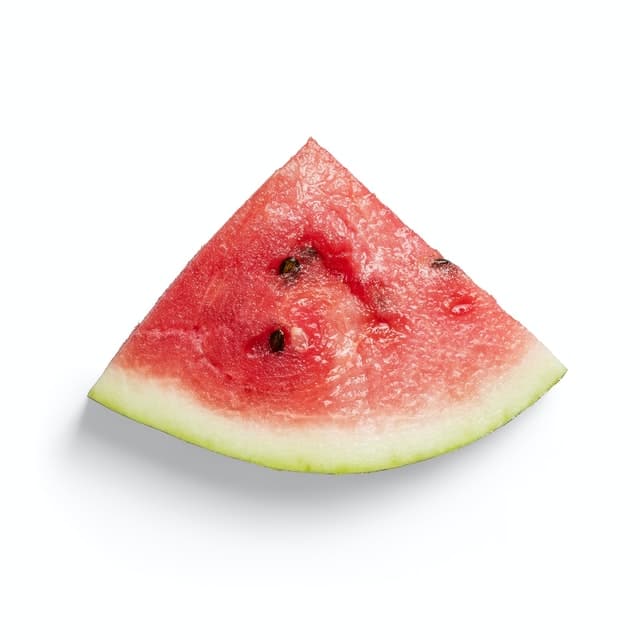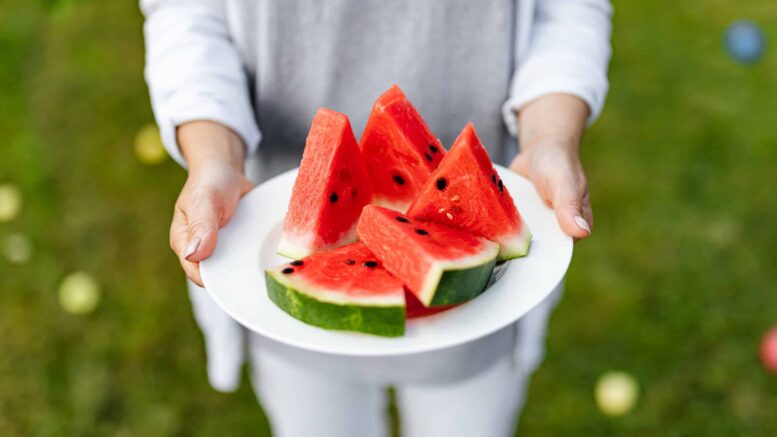Is Watermelon Good for Diabetes?
It is difficult to imagine summer without juicy and appetizing berries, which are loved by both adults and children. Yes, we are talking about watermelon.
After all, only in the summer can we enjoy its freshness, juiciness, and vitamins.
But is it good for people with diabetes?

Is watermelon good for diabetes?
Watermelon is a storehouse of useful vitamins, including vitamins E, A, C, and B1 (thiamine), B2 (riboflavin), B9 (folic acid), B6 (pyridoxine) and also contains potassium, magnesium, calcium, iron, calcium, sodium, fructose and sucrose.
Watermelon has a lot of useful properties that help to heal the body, avoid certain diseases and alleviate chronic ones.
Watermelon pulp and juice are some of the most effective choleretic (bile-secreting) and diuretics.
Thanks to the delicate dietary fiber in the fruit, it lowers the level of cholesterol in the body, and watermelon juice also cleanses the kidneys and liver from toxins.
100 grams of watermelon contains:
0.6 g of proteins,
0.1 g of fat,
7.6 g of total carbohydrates,
6,2 g sugars in mono- and disaccharide forms,
0.4 g of dietary fiber,
0.1 g of organic acids,
7.00mg of Calcium
0.24mg of Iron
112mg of Potassium
92.6 g of Water
Most of the mass of a watermelon is water, approximately 92-94%. Depending on the degree of ripeness and type, the content of mono- and disaccharides ranges from 5.5 to 13g.
Remember that mono- and disaccharides are easily digestible carbohydrates, and watermelon is represented by glucose, fructose, and sucrose (glucose + fructose).
Moreover, fructose in watermelon is more than other carbohydrates since it is the main carbohydrate in all types of fruits in general.
Oh, the Sugar!
Despite the presence of natural sugars in watermelon, its use is important for people with diabetes.
This berry, just like other fruits, is generally safe for blood sugar level balance, as the body absorbs fructose without much insulin requirement.
For people with diabetes on average 150-200 grams, 3-4 times a day is fine.
As long as you keep in mind to check blood sugar levels and limit the use of other foods with carbohydrates. But this only applies to type 1 and type 2 diabetes who are insulin-dependent, as they can control their sugar levels with an insulin injection.
For non-insulin-dependent type 2 diabetics, the permissible dose of watermelon per day is 200-300 grams.
Glycemic index and Glycemic load
What is the glycemic index of watermelon? There are no studies directly linking watermelon consumption to diabetes treatment.
However, there is evidence that it can reduce the risk of complications.
The glycemic index (GI) measures how quickly sugar enters the bloodstream.
Each food product is assigned an indicator from 1 to 100. The values are determined depending on how each food product is compared with the reference
Glucose:
Low GI – 50, Medium GI – 55-69 High GI – from 70
GI of watermelon is considered high, on average – 72-76.
Watermelon having high GI makes its safety for diabetics questionable.
And here comes the phrase that is often used when speaking about diabetics’ diet – “everything in moderation”.
Despite having a high GI, watermelon has a relatively low glycemic load. Glycemic load compromises the combination of GI and the real amount of carbohydrates in food.
GL is believed to provide a more realistic picture of how certain foods affect sugar levels.
- Low GL – 10
- Medium GL – 10-19
- High GL – from 19
GL is calculated using the formula: divide the GI of the product by 100g and multiply this value by the carbohydrate content.
In the case of a watermelon, the calculation is as follows: 76: 100 x 8 = 6.08.
This approach is often used when counting carbohydrates: foods with a low or medium GI do not raise blood sugar significantly.
Watermelon and Type 2 diabetes
A probable safe amount of watermelon for people with type 2 diabetes is 200-300 g per day, no more than 100 g at a time.
The intake of other carbohydrates should be reduced by the amount contained in the eaten watermelon.
This is explained by the fact that the second type of diabetes is accompanied by obesity: due to excess weight, the restriction in carbohydrates is much greater.
Watermelon has very low approximately 46 calories, that’s why it’s commonly consumed by those wishing for weight loss.
Watermelon and Type 1 diabetes
On the other hand, in type 1 diabetes, everything is a little easier.
Those who don’t adhere to a low-carb diet can freely eat watermelon in adequate quantities. At the same time, the use of watermelon requires a mandatory injection of insulin.
It must be remembered that there can be 5.5 to 13 g of carbohydrates per 100 g of the edible portion.
In Type 1 diabetes patients need to count the bread units (BEU). It has been established that in the first type of diabetes, it is permissible to consume 1 kg of watermelon per day in several doses of 200-300 g without health consequences.
The number of carbohydrates eaten should correspond to the dose of insulin received and the patient’s physical activity. Unlike the second type, blood sugar can be corrected by additional insulin administration, calculating the number of carbohydrates consumed.
The calculations take into account the correspondence of 120 -150 g of watermelon to 1 bread unit. It depends on the ripeness and variety of the fruit.
Endocrinologists recommend using watermelon for diabetes, given its beneficial properties, in an amount not exceeding 10 BEU per day.
At the same time, the consumption of usual carbohydrates (potatoes or bread) should be reduced.
Patients with the first type of diabetes should know how much insulin the body needs to break down 1 BEU – then watermelon can be eaten in allowed quantities without fear.
Besides sugars, It’s also noteworthy to mention that watermelon has many beneficial nutrients like antioxidants, vitamins, and amino acids.
Watermelon plays a big role in controlling the blood pressure of a person suffering from diabetes. Amino acid citrulline – an important component of watermelon – is known to reduce systolic blood pressure.
In addition, magnesium and potassium in watermelon can improve blood circulation and aid kidney function.
Lycopene – a plant nutrient with antioxidant properties, is advantageous for heart and bone health. These nutrients can help prevent diabetic complications.
It’s interesting to note that a Pubmed study conducted in April 2020 states that “watermelon (Citrullus lanatus in Latin) juice may have a useful clinical application in the management of diabetes mellitus and its metabolic complications if developed as adjuvant therapy.”
In conclusion
Watermelons are generally considered to be a safe and good snack for people with diabetes, plus it also has nutrients that can help prevent diabetic complications, although it has to be consumed in limited amounts.
Keep portions in check! Always make sure to consult with your doctor about your dietary changes.
References:
https://www.nutritionvalue.org/
https://www.hindustantimes.com/health/
https://www.webmd.com/diabetes/
https://www.practo.com/consult/
https://www.ncbi.nlm.nih.gov/pmc/articles/
https://foodstruct.com/food/watermelon
https://pubmed.ncbi.nlm.nih.gov/
https://www.webmd.com/vitamins/ai/
See Also
Is Apple Good for Diabetes

As a nutritionist, I research, find and experiment with recipes, natural diets and meal plans for weight loss, bodybuilding, and detoxing.


